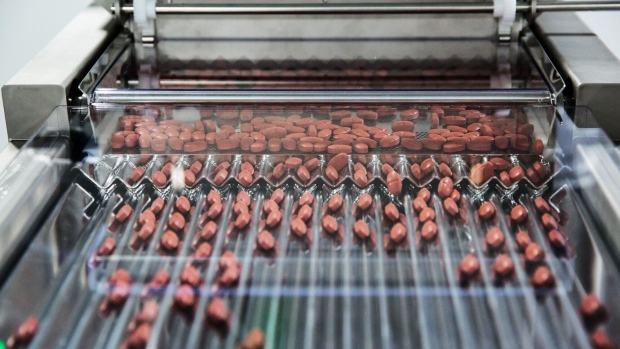Apr 2, 2024
Biden Plan Calls for Hospitals to Pay More for Drugs to Head Off Shortages
, Bloomberg News

(Bloomberg) -- The Biden administration wants to tackle rampant shortages of drugs for cancer and other diseases with a multibillion-dollar plan that calls for hospitals to pay more for reliable supplies of high-quality medicines.
US health officials met with congressional leaders Tuesday to lay out their vision for legislation that would set standards for hospitals to follow when purchasing medicines, including key generic drugs. Costing as much as $5.11 billion over 10 years, the plan aims to pressure the market to ensure Americans have reliable supplies of high-quality medicines.
The legislative push is the result of a more-than-yearlong effort by a team of White House advisers and officials from across the Department of Health and Human Services. Bloomberg News first reported on the team’s work to address chronic problems hurting America’s drug supply last year as the nation faced shortages of hundreds of drugs, including chemotherapies and antibiotics.
The administration wants to “address the market failure that currently exists, which is that there is no entity that's accountable to supply chain,” Neera Tanden, President Joe Biden’s domestic policy adviser, said in an interview. “Today when we have a drug shortage, various entities within the healthcare system point to each other.”
US drug shortages last year rose to their worst in almost a decade, drawing attention from patient advocacy groups, lawmakers and even Pentagon leadership, which views the nation’s dependence on China and India for generic drugs as a national security threat. The military views more than a quarter of US-designated essential medicines as “very high risk,” where procurement and availability may be threatened.
“The way our healthcare system buys essential medicines isn’t working and leads to costly, harmful drug shortages and an overreliance on China,’’ said Lael Brainard, Biden's national economic adviser. “We need new solutions, including increased domestic production, rewarding resilience, and transparency among middlemen.”
The suspension of production at a plant in India run by Intas Pharmaceuticals hastened health officials' work to address the brittleness of the generic drug supply chain, according to a senior administration official who asked not to be named as details of the plan aren’t public. The plant made essential drugs for the US market. Food and Drug Administration Commissioner Robert Califf and Centers for Medicare and Medicaid Services Administrator Chiquita Brooks-LaSure worked with the White House to design the strategy, the official said.
The White House proposal urges Congress establish a “Manufacturing Resiliency Assessment Program” that would score drugmakers according to manufacturing quality and ability to supply products consistently. It also proposes a “Hospital Resilient Supply Program” that would allow the federal government to reward hospitals that purchase drugs from reliable, diverse suppliers and penalize those that don’t. The administration needs action from Congress to allow Centers for Medicare and Medicaid Services to reward providers that meet the performance standards, which would be developed with industry, Tanden said.
The plan, detailed in an 18-page document that was viewed by Bloomberg, suggests that a non-governmental entity would evaluate and score drug manufacturers and their production processes, without assessing individual drugs. The information would be used by hospitals making purchasing decisions.
CMS would make payments to hospitals that meet their performance metrics or penalize those that don’t. The payments or penalties “would have to be large enough to incentivize change,” the document said, without detailing specific costs.
The Biden administration isn’t advocating for independent testing of individual medicines, a model that’s been taken up by major health systems from Kaiser Permanente to the Defense Department’s Military Health System. The administration doesn’t want to undermine the FDA’s role as the “arbiter of the quality of drugs,” Tanden said, but wants to strengthen the agency’s ability to encourage manufacturers to maintain good production practices.
Read more about US drug shortages:
- US Military at Risk From Reliance on Cheap Foreign Drugs, Senators Say
- The Pentagon Wants to Root Out Shoddy Drugs. The FDA Is In Its Way.
- What Will It Take for the US to Solve Drug Shortages?
- White House Assembles Secret Team to Tackle Drug Shortages, Quality Woes
Last year, the administration’s efforts to build momentum around a $25 billion legislative package aimed at boosting US drug manufacturing and making the supply chain more transparent fell apart in the wake interagency disagreements. Tanden suggested that there’s now bipartisan support for congressional action on the issue.
“We’ve gotten great response from Republicans and Democrats,” she said. “We hope Congress passes this ahead of—not during or after—the next drug shortage.”
©2024 Bloomberg L.P.


